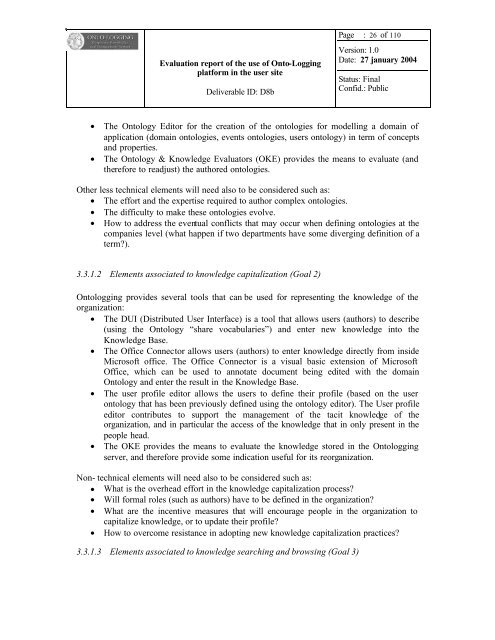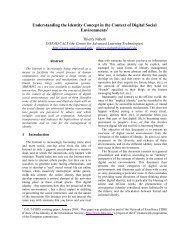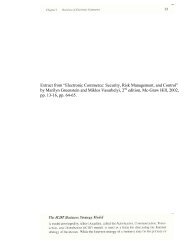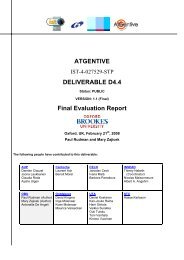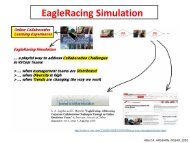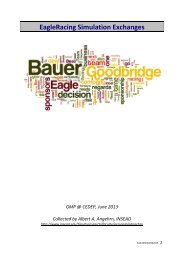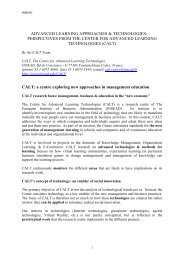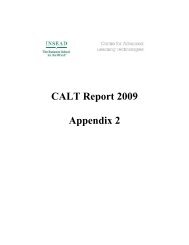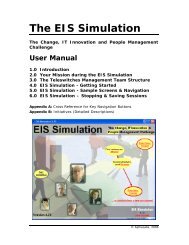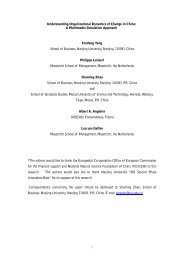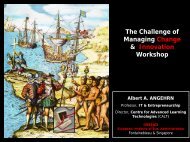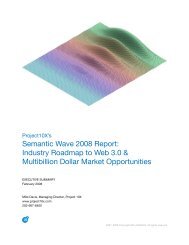pdf 820Kb - INSEAD CALT
pdf 820Kb - INSEAD CALT
pdf 820Kb - INSEAD CALT
You also want an ePaper? Increase the reach of your titles
YUMPU automatically turns print PDFs into web optimized ePapers that Google loves.
Evaluation report of the use of Onto-Logging<br />
platform in the user site<br />
Deliverable ID: D8b<br />
Page : 26 of 110<br />
Version: 1.0<br />
Date: 27 january 2004<br />
Status: Final<br />
Confid.: Public<br />
• The Ontology Editor for the creation of the ontologies for modelling a domain of<br />
application (domain ontologies, events ontologies, users ontology) in term of concepts<br />
and properties.<br />
• The Ontology & Knowledge Evaluators (OKE) provides the means to evaluate (and<br />
therefore to readjust) the authored ontologies.<br />
Other less technical elements will need also to be considered such as:<br />
• The effort and the expertise required to author complex ontologies.<br />
• The difficulty to make these ontologies evolve.<br />
• How to address the eventual conflicts that may occur when defining ontologies at the<br />
companies level (what happen if two departments have some diverging definition of a<br />
term?).<br />
3.3.1.2 Elements associated to knowledge capitalization (Goal 2)<br />
Ontologging provides several tools that can be used for representing the knowledge of the<br />
organization:<br />
• The DUI (Distributed User Interface) is a tool that allows users (authors) to describe<br />
(using the Ontology “share vocabularies”) and enter new knowledge into the<br />
Knowledge Base.<br />
• The Office Connector allows users (authors) to enter knowledge directly from inside<br />
Microsoft office. The Office Connector is a visual basic extension of Microsoft<br />
Office, which can be used to annotate document being edited with the domain<br />
Ontology and enter the result in the Knowledge Base.<br />
• The user profile editor allows the users to define their profile (based on the user<br />
ontology that has been previously defined using the ontology editor). The User profile<br />
editor contributes to support the management of the tacit knowledge of the<br />
organization, and in particular the access of the knowledge that in only present in the<br />
people head.<br />
• The OKE provides the means to evaluate the knowledge stored in the Ontologging<br />
server, and therefore provide some indication useful for its reorganization.<br />
Non- technical elements will need also to be considered such as:<br />
• What is the overhead effort in the knowledge capitalization process?<br />
• Will formal roles (such as authors) have to be defined in the organization?<br />
• What are the incentive measures that will encourage people in the organization to<br />
capitalize knowledge, or to update their profile?<br />
• How to overcome resistance in adopting new knowledge capitalization practices?<br />
3.3.1.3 Elements associated to knowledge searching and browsing (Goal 3)


